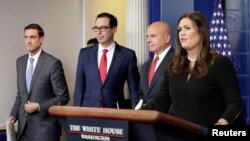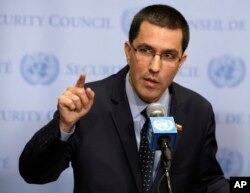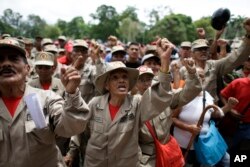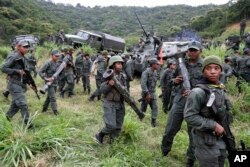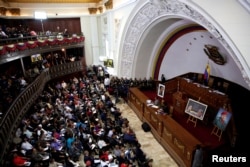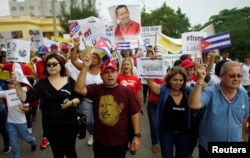The United States on Friday forbade any dealings in new Venezuela debt or equity in Washington's latest move to pressure the repressive government of President Nicolas Maduro.
The sanctions were meant to demonstrate that "the United States will not allow an illegitimate dictatorship to take hold in the Western Hemisphere at the expense of its people," national security adviser H. R. McMaster told reporters.
"No military actions are anticipated in the near future," McMaster responded when asked about the possibility of intervention in Venezuela by U.S. forces. White House press secretary Sarah Huckabee Sanders, when asked a few minutes later to elaborate, said, "We leave all options on the table and we're not taking any of those things off."
An executive order, signed Friday by President Donald Trump, bars U.S. transactions with Maduro's government and the PDVSA state oil company.
Treasury Secretary Steve Mnuchin said during a White House news conference Friday that the sanctions would "undermine Maduro's ability to pay off political cronies and regime supporters."
"On the economic front, I would say our plan has to continue to turn up the heat on the Venezuelan government, and these specific actions, we've tried to balance things that don't hurt the Venezuelan people," Mnuchin said.
In Caracas, Maduro said Friday that the U.S. action was designed to push his country into default and essentially would force the closure of its U.S. refining unit, Citgo.
In a TV address from the presidential palace, Maduro said a preliminary analysis showed the sanctions would impede Venezuela's crude exports to the United States.
'Get their attention'
At U.N. headquarters, U.S. Ambassador Nikki Haley told reporters: "We have had no choice but to turn around and do the sanctions to get their attention."
Venezuelan Foreign Minister Jorge Arreaza responded to the announcement of new sanctions while at the U.N. to discuss the situation in his country with U.N. Secretary-General Antonio Guterres.
"Maybe the United States is trying to create ... a humanitarian crisis in our country? What do they want — they want to starve the Venezuelan people?" Arreaza asked.
The foreign minister added that Maduro had been intent on having good relations with Trump, but said, "These financial sanctions announced today are the worst aggressions to Venezuela in the last 200 years, maybe."
A senior administration official in Washington told reporters in a telephone briefing minutes after the latest sanctions were announced: "We will not participate in extending debt or equity or bonds or new bonds or securities that enable this regime to perpetuate its cycle of violence and oppression."
Officials said the new order does allow the U.S. Treasury Department to provide licenses for other commercial and humanitarian transactions, including financing for commercial trade and petroleum exports and imports.
"What we're trying to do here is create a series of escalatory measures that we can take," a senior administration official said. "Obviously, the United States has a lot of influence over the Venezuelan economy, but it doesn't mean we want to rush in and use our influence in an irresponsible manner."
He added, "The goal here is for the restoration of democracy to be brought to Venezuela. Our goal is not to continue to escalate this. Nobody wants that."
Free, fair elections
The White House said Maduro also needed to hold free and fair elections and release all political prisoners.
"The Maduro dictatorship continues to deprive the Venezuelan people of food and medicine, imprison the democratically elected opposition, and violently suppress freedom of speech," a White House statement said. "The regime's decision to create an illegitimate constituent assembly — and most recently to have that body usurp the powers of the democratically elected National Assembly — represents a fundamental break in Venezuela's legitimate constitutional order."
Last week, Venezuela's constituent assembly gave itself the power to pass laws, seizing legislative power from the opposition-led congress.
The assembly unanimously passed a decree enabling it "to legislate on matters directly aimed at ensuring the preservation of peace, security, sovereignty, the socioeconomic financial system, the purposes of state and the preeminence of Venezuela's human rights."
The election of the assembly last month was boycotted by the opposition and triggered international condemnation. The body is charged with rewriting the country's 1999 constitution and has given permission to Maduro to rule by decree.
Russian, China
There are fears that strong U.S. pressure could drive Maduro into the arms of China and Russia for the sake of his political survival.
"These steps now to point out the risks of dealing in further, future debt placements should give both of those countries a deep pause before they further deepen their engagement in this region," a senior U.S. official said. "And we think it will have an important, dissuasive effect on their own calculations."
U.S. Representative Eliot Engel of New York, the top Democrat on the House Committee on Foreign Affairs, said in a statement that Trump must ensure U.S. sanctions "have the appropriate impact and adjust them as necessary."
Engel also called for other countries and the U.N. to push for a resolution to the political crisis and the Venezuelan people's lack of access to food and medicine.
"I have a long record in Congress of supporting strong actions against rogue regimes and will continue to do so," Engel added.
U.S. and International Monetary Fund officials said Venezuela's economy continues to severely contract, oil production is rapidly declining and the government is liquidating its visible assets — all of which contributes to a deepening humanitarian crisis in the Latin American country.
VOA's Margaret Besheer contributed to this report from the United Nations. Some information for this report came from Reuters.




